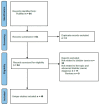Artificial Intelligence in the Advanced Diagnosis of Bladder Cancer-Comprehensive Literature Review and Future Advancement
- PMID: 37443700
- PMCID: PMC10340656
- DOI: 10.3390/diagnostics13132308
Artificial Intelligence in the Advanced Diagnosis of Bladder Cancer-Comprehensive Literature Review and Future Advancement
Abstract
Artificial intelligence is highly regarded as the most promising future technology that will have a great impact on healthcare across all specialties. Its subsets, machine learning, deep learning, and artificial neural networks, are able to automatically learn from massive amounts of data and can improve the prediction algorithms to enhance their performance. This area is still under development, but the latest evidence shows great potential in the diagnosis, prognosis, and treatment of urological diseases, including bladder cancer, which are currently using old prediction tools and historical nomograms. This review focuses on highly significant and comprehensive literature evidence of artificial intelligence in the management of bladder cancer and investigates the near introduction in clinical practice.
Keywords: artificial intelligence; bladder cancer; deep learning; diagnosis; machine learning.
Conflict of interest statement
The authors declare no conflict of interest.
Figures
References
-
- Human Intelligence—Cognitive-Contextual Theories|Britannica. [(accessed on 22 February 2023)]. Available online: https://www.britannica.com/science/human-intelligence-psychology.




